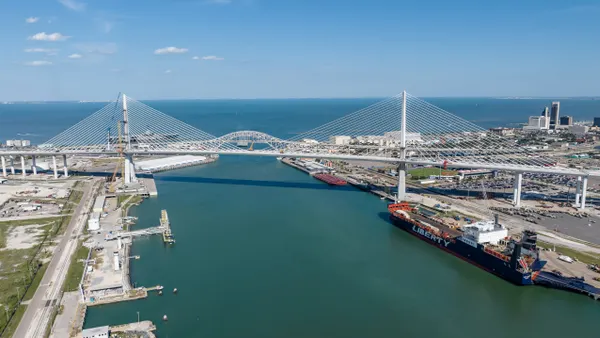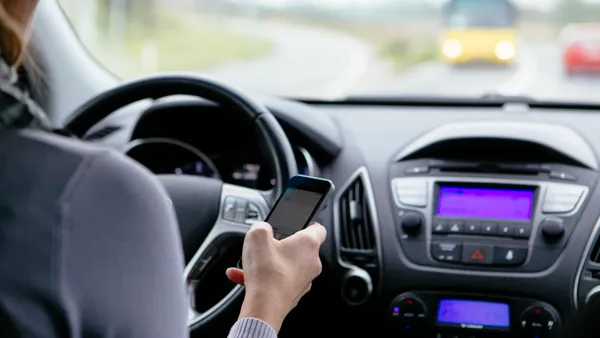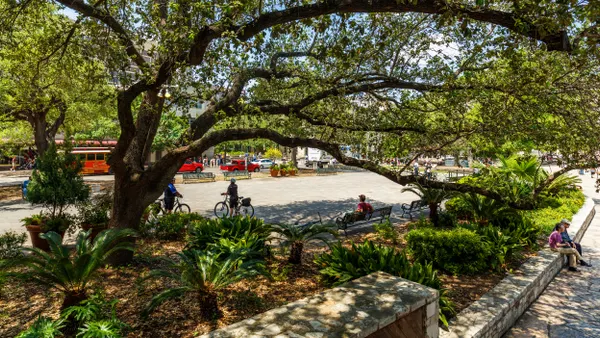Dive Brief:
- Los Angeles Mayor and outgoing Metro board chair Eric Garcetti touted continuing work "to ease congestion and deliver the world-class transportation network our region deserves” in the newly released annual Los Angeles County Metropolitan Transportation Authority (Metro) State of the Agency report.
- Metro CEO Phillip A. Washington introduced a five-point plan: implement mobility innovation, capture the hearts and minds of the people, embrace equity, build the industry, and step into leadership voids.
- Incoming Metro board chair Sheila Kuehl discussed plans to train and hire more women in non-traditional positions and lauded the NextGen Bus Study, which is going on now as the first step in restructuring the city's bus system.
Dive Insight:
Los Angeles hasn't exactly been heralded as a transportation or mobility leader over the past few decades, considering its car-dependent residents and reputation for having some of the worst traffic — and consequently, pollution — in the world.
Garcetti's administration has taken on a number of initiatives to improve the environment by reducing vehicle emissions and lessening single-passenger vehicle trips. This spring, the city's Department of Transportation proposed expanding the bike-share system. The city endorsed a plan by the Natural Resources Defense Council to transform L.A. into a national transportation leader with recommendations for congestion pricing and incentivizing the use of electric vehicles for ride-sharing.
City leaders have also pledged compliance with a variety of environmentally-focused initiatives, such as the global Fossil Fuel-Free Streets Declaration, which is reflective of the city's goal to electrify its entire bus fleet by 2030.
Promoting public transit is a significant way cities can reduce congestion and single-passenger vehicle trips, but L.A. locals haven't embraced Metro's transit system as readily as residents in other cities. The rail system in particular hasn't gained widespread traction and its ridership is in decline. Bus ridership consistently has been higher than rail, but it also is on the downswing, dropping about 25% in the past five years.
In response, Metro has stepped up its efforts to revamp the transit system and make it more appealing to residents, as mentioned by Kuehl. The NextGen bus project will be the first major overhaul of that transportation mode in more than 25 years, which Metro views as important because the bus network carries more than 70% of the city's total transit customers. The bus study aims to "design a new bus network that is more relevant, reflective of and attractive to the residents of L.A. County," according to the project website. The revamped service is expected to go into effect in fall 2019.
Improving bus service is in line with the transit agency's goals of promoting equity and better reaching underserved populations. Not only is the bus the most widely used transportation mode in L.A. and across the country, but it is also the most affordable and provides the most widespread network of routes. Low-income residents patronize bus systems at high rates for these reasons, plus the fact that they're less likely to own cars. L.A.'s push to improve its bus system is one way to support long-range equitable transportation services and enhance the lives of all residents.
The rail portion of the transit system also is getting a facelift. Rail is undergoing a rapid expansion over the next 10 years, with a nine-mile subway extension and a number of "connector" segments to fill gaps.
Metro isn't simply focusing on its existing traditional transit options, either; leaders recognize the way people consume transportation services has evolved and they're adding new modes of mobility and convenience measures. For example, the transit agency launched work on an app to allow transit riders the convenience of paying for trips by scanning their smartphones, and it's working to add free Wi-Fi, charging stations and interactive tablets at all rail stations. It's also seeking partnerships for microtransit that would offer on-demand trips with dynamic routes akin to ride-share services, rather than trying to fight the growth and popularity of ride-share.
More ambitious projects that may or may not come to fruition include The Boring Company's high-speed, underground Loop and a proposed aerial tram, or gondola, connecting Union Station and Dodger Stadium.
The gondola project is one of the 100 unsolicited proposals that the transit agency has received and evaluated. Metro CEO Phillip A. Washington emphasized during the State of the Agency report the importance of forging such public-private partnerships (P3s) to advance a flourishing transportation network.
Although state of the agency reports sometimes can be long on accolades and short on measurable results, the L.A. Metro does have a lot of progress to celebrate over the past year, as well as concrete plans for advancement in the coming decade.











